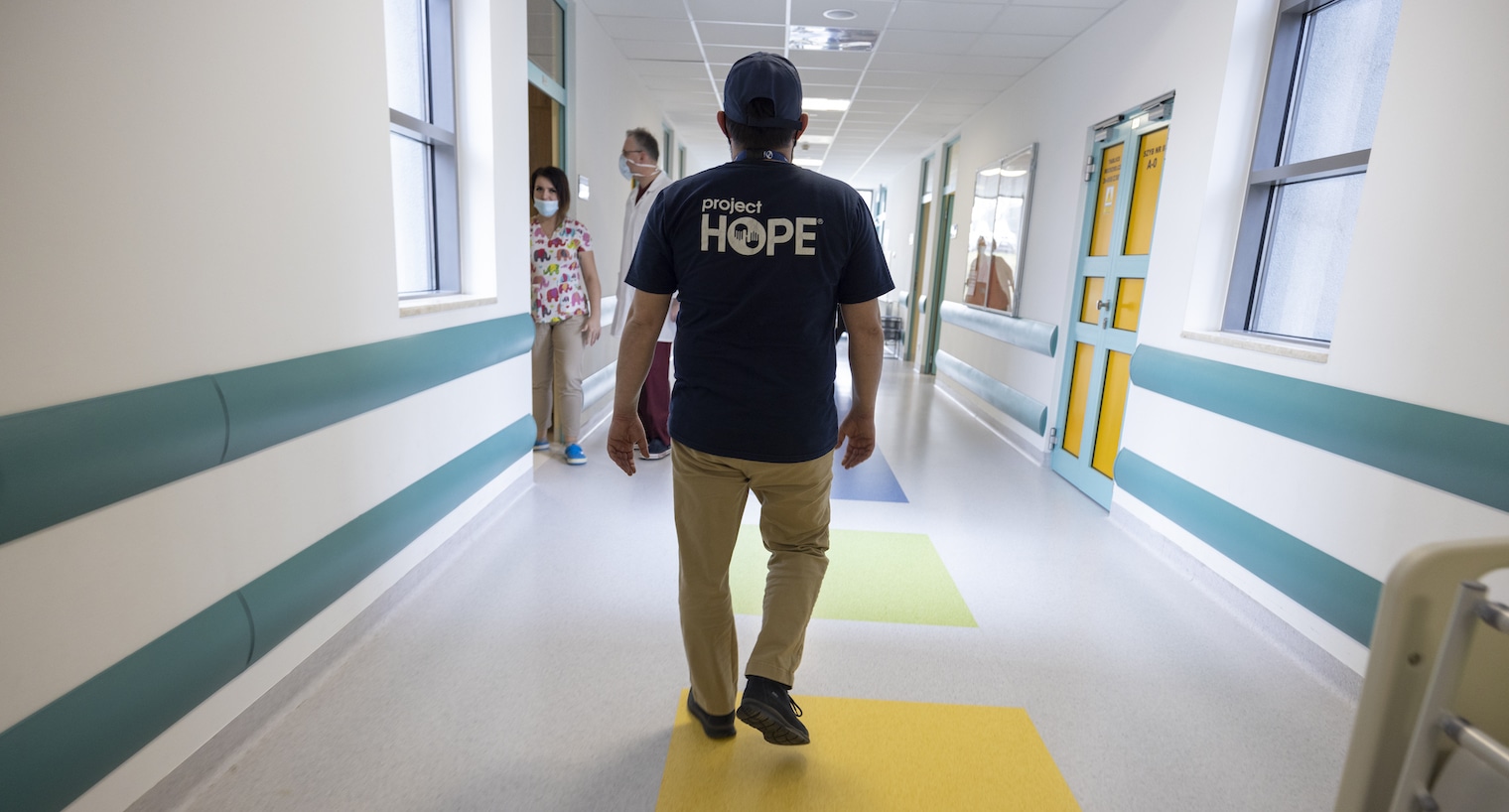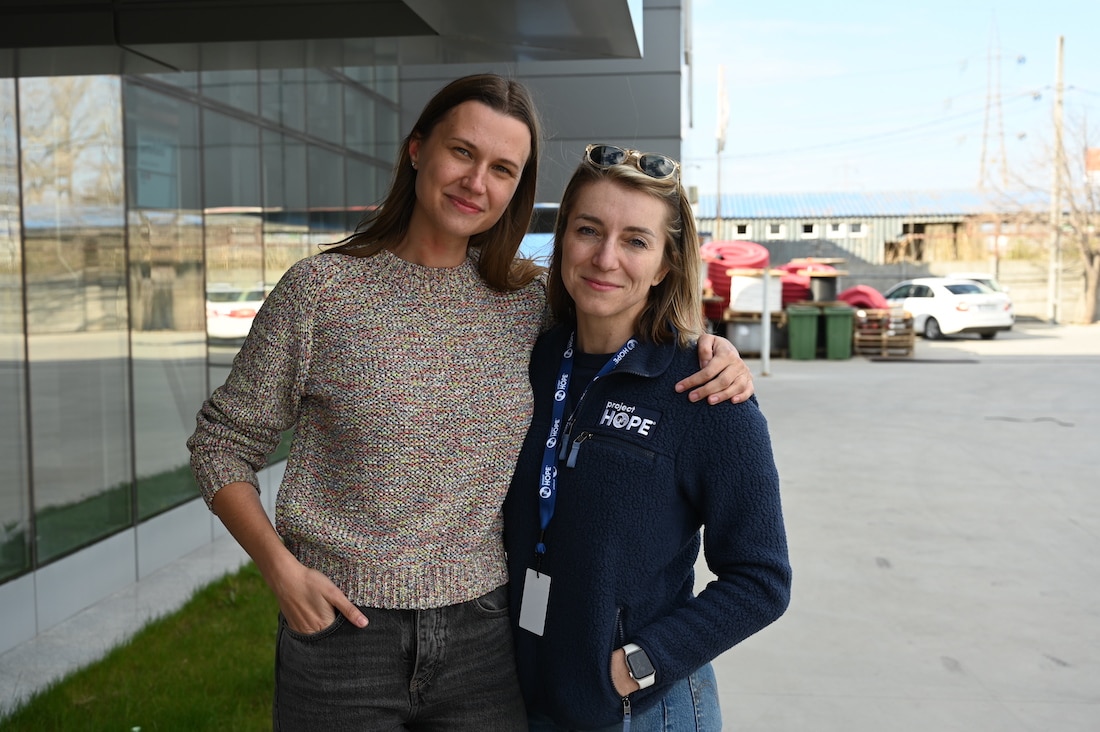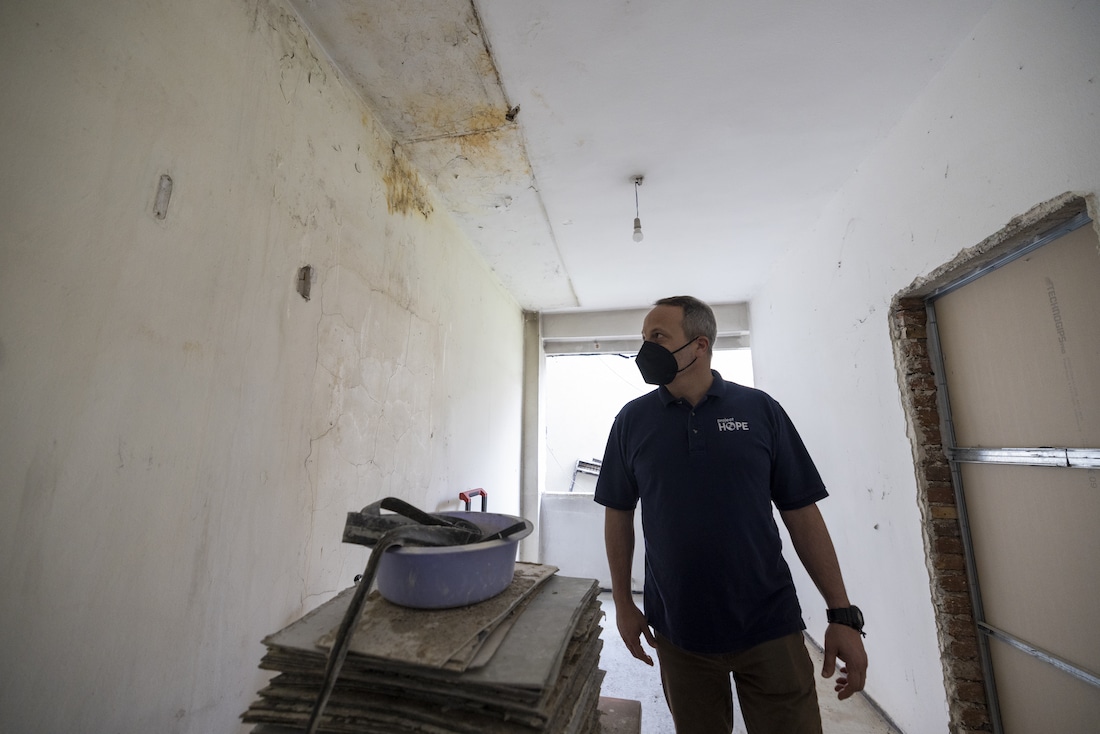
Living Through Crisis: Project HOPE Staff Stories
As the Ukraine crisis endures, Project HOPE team members share their personal experiences living through conflict and the difficult memories the war has resurfaced.
Project HOPE team members are a global team of committed humanitarians who bring diverse backgrounds, perspectives, and experiences around the world. Some of those experiences include growing up amid conflict and crisis, or hearing first-hand accounts from parents and friends who did.
For anyone who has experienced conflict or displacement, the Ukraine crisis is a painful reminder of the lasting scars of war. Read on for four stories from Project HOPE team members whose lives have been shaped by crisis and conflict, and how the current moment in Ukraine resurfaces memories from years past. To learn more about our response in Ukraine and the surrounding region, click here.

Chessa Latifi
Senior program advisor, Los Angeles, CA
My family is Kosovar Albanian. We immigrated to the United States in the ‘80s, but my entire extended family stayed in Kosovo. I was very, very close with them — my parents would send my older sister and I back to Kosovo for three months at a time in the summer to stay in the little village where my dad grew up.
Then in 1999, with the Serbian offensive, my family fled and was part of the stream of refugees that escaped their homes in the middle of the night and ran to the border of Macedonia and Albania. I was 14 at the time, and my parents were in such a traumatic position watching this happen to their family. I remember the news being on all the time, and trying to get phone calls from people, and hearing about friends or family members who had died. I went online and started soliciting businesses for donations to buy shoes for kids when they reached the border. I ended up getting a $1,000 donation from an Albanian pizzeria, which is a huge deal at 14.
All of these people — all of these refugees and IDPs and every Ukrainian — have had their entire lives disrupted. We cannot look at these numbers and let them become a blur.
Here we are, more than 20 years later, and I’m doing the same exact thing, just with a different population. I’m the desk officer for the Ukraine response. I coordinate programmatic efforts and communications, and act as the filter between Ukraine, the surrounding refugee response countries, and headquarters. In these times of tragedy, there’s nothing that feels more relevant, important, or purposeful than doing this work.
There are so many parallels between now and then. The Albanians, we’re all watching what’s happening and reliving our own trauma. We’re considering the broader threat to the region and the Balkans.
On a visit to the region recently, I went to a border crossing where I watched women, children, and the elderly fleeing into Poland with only a bag or two on their backs. I thought about how my grandmother had to run out of her modest home in the middle of the night, and how every single family member I had in Kosovo lost their home during the war. I thought about my cousins, who were my age and younger, being part of those large convoys of people crossing the border. I listened to the stories of women who had fled with nothing and were now in limbo, trying to figure out when they can go home again, and what’s even left of home. It’s just happening all over again. It’s the same thing, but on a much larger geographic scale. It’s a lot. It’s heavy.
We can’t forget that millions of people are still individual people. Millions of people are millions of stories. All of these people — all of these refugees and IDPs and every Ukrainian — have had their entire lives disrupted. We cannot look at these numbers and let them become a blur. This conflict could end tomorrow, and the impact of it will last for generations. There’s no easy way to fix this or make it better.


Christina Rudyj
Associate Director, Digital Product Management, Health Affairs, Washington, D.C.
Both of my parents escaped Russian and German occupation of Ukraine during World War II. My mom was born in western Ukraine. Her father was arrested twice because he was a priest, but he managed to get released and my family escaped into Poland, Slovakia, and Austria. My mom was 4 when the journey started, and like today’s refugees, they weren’t quite sure where they were going.
My dad was a teenager. He was also born in western Ukraine, in an area where the border constantly shifted. His father was very involved in politics and his mother was a teacher. There was a very real threat of having someone knock on your door in the middle of the night and getting arrested, shot, or sent off to a camp and never being seen again. They knew they had to leave everything behind and traveled through Hungary, Slovakia, and Austria.
I think the hardest part is seeing these live images on TV. It’s one thing to hear it as an oral history, but to actually see the civilian population getting displaced has been fairly traumatic.
Both of my parents ended up spending parts of their childhoods in post-war displacement camps. There were hundreds of thousands of Ukrainian and other eastern Europeans and Jews in the camps. When they were able to immigrate, it took my mom’s family four weeks to travel to the United States by ship. When I visited Ellis Island in 2018, I managed to find the ship manifest listing my mom, her family, my dad, and his family as well. It was so exciting to see my family’s journey as part of historical documents, and very emotional as well.
I’ve listened to their personal accounts many times. I grew up first generation Ukrainian-American and went to a Ukrainian school in Philadelphia. I call it “the Ukrainian Philly contingent” — there’s a strong sentiment of unity and tradition there that still continues on today. Now my nieces, our second generation of Ukrainian-Americans, are involved in the Ukrainian community there. One of them was actually living in western Ukraine in the process of earning her graduate degree and came home to the U.S. about a week before Russia invaded.
My mother is 82 now. It’s hard talking to her right now because she’s heartbroken and can’t believe what’s going on. Who would have thought? It’s bringing back memories all over again. I think the hardest part is seeing these live images on TV. It’s one thing to hear it as an oral history, but to actually see the civilian population getting displaced has been fairly traumatic.
It’s really important to know your history, because otherwise it will repeat itself. Ukraine is a big litmus test for democracy, but there are other conflicts going on in the world and those are humans are well. People are people, no matter where you live or what your culture is. Everyone should be treated fairly in the face of conflict.

Rabih Torbay
Project HOPE President and CEO, Washington D.C.
I grew up in Lebanon and was 4 when the civil war started. I vividly remember the sights and sounds of the bombing and the shelling, which is very similar to what’s happening in Ukraine now. They would basically bombard an area relentlessly, to the point where all you would hear was rumbling, like thunder. We didn’t have shelters, so you’d run to the first floor, which is the safest, and lie down on the floor, flat on your stomach, covering your ears with your mouth slightly open to relieve the pressure.
Does this current moment resurface memories? Every day. Every time I see conflict on TV, even 40 years later, I relive those memories — all it takes is one trigger to bring it all back.
Two of my brothers joined the conflict, and I remember seeing them in the morning get up and take their weapons to the warfront, not knowing whether I’d see them again. I remember filling up sandbags and putting them up against the windows so if a bomb dropped nearby the shrapnel wouldn’t come through them. Life had to continue. We had to go to school — and sandbags were everywhere there, too — and whenever there was a lull in the fighting, you would take the bus back home. You didn’t know whether you were going to make it through the day or not. That was everyday life, on and off, for 17 years for me.
The war lasted until I was about 21, and I left soon after it ended. Getting out of Lebanon was a blessing, but it’s also painful to leave your country and start from scratch. I was the youngest of the family, and I left my parents, brothers, sisters, and friends to go to a country where I didn’t know anyone. And I never went back.
Does this current moment resurface memories? Every day. Every time I see conflict on TV, even 40 years later, I relive those memories — all it takes is one trigger to bring it all back. I hadn’t thought about lying down on the floor covering my ears and opening my mouth until I saw an interview with a Ukrainian mom saying that’s what she was telling her kids to do. And when I see fathers taking their wives, mothers, sisters, and children to the train station to say goodbye, and kids clinging to their fathers not wanting to let go, it’s heartbreaking. It reminds me of when my brothers were going to the warfront and how I’d say bye to them not knowing when I was going to see them again, if I’d see them again. It’s exactly what we lived through during the war in Lebanon.
The countries and tactics might change, but the end results are the same. Destruction. Suffering. Starvation. Death. At the end of the day, it’s families that suffer. It’s children who will never see their parents again. It’s a wife who will never see her husband again. It’s a husband who will never see his wife. It’s parents who bury their children. It’s people who leave their countries. It’s a trauma that cannot be erased. That’s what war brings.


Entesar Yassin
Project Accountant, Montreal, Canada
I feel very sad for what is happening in Ukraine, especially because I lived and worked for almost two years in many of the cities that are under attack.
I’m not a refugee, but I know what they are going through. I grew up in Yemen. Yemen is a beautiful country — the birthplace of coffee, with a rich and vibrant culture and warm, hospitable people who love their country. But the war has been a tragedy that has made life more difficult for millions of people, taking away their access to health care, causing a lack of health care services and medications, and forcing many children to lose their education.
Nothing can be more devastating than forcing someone to leave their home, family members, childhood memories, and stable job for the unknown.
In 2014, I got the opportunity to move to Africa to join an international humanitarian organization. I thought it would be easy. I thought I’d be like any international employee who can go home to visit their country every year. But I’ve only been able to go back to Yemen one time since 2015. Though I left, my family is still there, and I haven’t seen them all of these years. I don’t regret the decision to take the job in Africa, but if the war did not start at home, I’d be able to visit them and would not be struggling now.
What is happening in Yemen, Ukraine, and other countries is beyond horrible. None of us would want to leave our homes without knowing when, if ever, we would be able to return. Nothing can be more devastating than forcing someone to leave their home, family members, childhood memories, and stable job for the unknown. When a refugee reaches their destination, if they are lucky enough to make it out alive, they start from zero — it doesn’t matter their education or social standing.
This can be an incredibly difficult transition. As a board member of The Canadian Arab Women’s Association (CAWA), I witness a lot of women and youth who feel isolated and depressed for many years after their arrival to a new country, and every time they hear about a new crisis like what’s happening in Ukraine, it brings back their home country war memories again. They feel the same pain and heartbreak again and again.
It’s important to remember that even if someone is able to cross international borders to find safety and settle down in a new country, they still hold on to the hope that their country will be safe so that one day they can go back. War has destroyed Yemen, but with hope — and through the resolve and resilience of its people — the country will recover from the devastation and be much better than before. I know Ukrainians are holding on to that same hope.
The question I’ll always be asking is how we can help countries in conflict solve their challenges, so people don’t have to leave their country and become refugees? This is what we need to think about: how can we make peace?
How you can help
Make a lifesaving gift to support our work now and for the future at projecthope.org/donate
Are you a health-care or other professional who would like to learn more about volunteering abroad with Project HOPE? Learn more about our volunteer program and join our volunteer roster.
Stay up-to-date on this story and our lifesaving work around the world by following us on Facebook, Instagram, LinkedIn and Twitter, and help spread the word by sharing stories that move and inspire you.